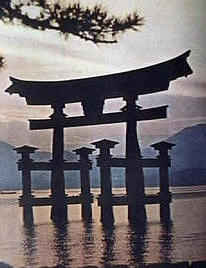| |||||||||
JAPANESE POETRY
A very
short poem (17 syllables) with a traditional,
classic form (three lines of 5 - 7 - 5
syllables)
intended to express and evoke
emotion.
Most true haiku contain a word
("kigo") suggesting a
particular season of the
year and they usually are
made up of the
following two elements:
(1) a general condition (permanence)
(2) a momentary perception (change)
It is the meeting of these two
elements that creates
the "spark" of haiku,
without which, the verse is not
haiku but
merely a brief 17 syllable statement.
The
poet does not comment on the connection
between the two
elements but leaves the
synthesis of the two
images up to the reader
to perceive through
his own experience.
TIME and PLACE and a
FLEETING OBSERVATION
work together as a
STARTING POINT for the
reader's own train
of thought, emotions and
experience and he
must fill in all the rest.
Haiku begin in
the middle of a scene or thought
and then end
immediately after the thought
has been
suggested or indicated.
A haiku poet is a
"Zen man" in that the
unfinished nature of
his poem corresponds
to the positive use of
"what is not there!"
~~~~~~~~~~~~~~~~~~~
Natsukusa ya
tsuwa mono domo ga
yume no
ato.
Summer grasses
of brave
warrior's dreams
all that
remains.
~~~~~~~~~~~~~~~~~~~~~~~~~~~~
Furu
ike ya Old pond ~~~~~~~~~~~~~~~~~~~~~~~~~~~~
Koi ni mina Did it yell ~~~~~~~~~~~~~~~~~~~
Hana no kage In the blossom's shade
~~~~~~~~~~~~~~~~~~~~~~~~~~~~
Toi yama
no In its eye
~~~~~~~~~~~~~~~~~~~~~~~~~~~~
Haranaka ya Above the moon ~~~~~~~~~~~~~~~~~~~~~~~~~~~~
Yare utsu na Oh don't mistreat the fly. ~~~~~~~~~~~~~~~~~~~~~~~~~~
Kago no
tori At the butterflies ~~~~~~~~~~~~~~~~~~~
Shizu no ko ya A peasant's child
~~~~~~~~~~~~~~~~~~~~~~~~~~~~
Yagate
shinu Soon they will die, ~~~~~~~~~~~~~~~~~~~~~~~~~~~~ Utsukushi ya A lovely thing to see, ~~~~~~~~~~~~~~~~~~~~~~~~~~~~
kawazu tobi komu
mizu no
oto.
and a frog jump
in
water sound.
naki shimaute
ya
semi no kara.
til it became
all voice?
cicada shell!
utai ni nitaru
tabine kana
.
as in the noh drama
a traveler sleeps.
me dama ni utsuru
tombo
kana.
are mirrored far
off mountains
the dragonfly.
mono ni mo tsukazu
naku hibari.
not attached to anything
a skylark sings.
hae ga te wo suru
ashi wo suru.
He wrings his hands
he wrings his feet.
cho wo urayamu
me tsuki kana.
the caged bird gazes
envying
just watch its eyes!
ine suri kakete
tsuki wo miru
.
husking rice pauses
to look at the moon.
keshiki wa mie zu
semi no
koe.
yet showing no sign of it
cicada's screech.
shoji no ana no
ama no gawa.
through the paper
window's hole
the Milky Way.


